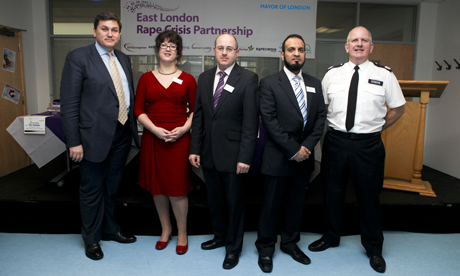Hackney gets its new rape crisis centre

(L-R): Kit Malthouse, Deputy Mayor of London for Policing; Karen Ingala Smith, Chief Executive of the nia project; Councillor Keith Prince, Leader of Redbridge Council; Councillor Shoaib Patel, Cabinet Member for Environment and Community Safety, Redbridge Council; Commander Jim Webster, Metropolitan Police
Victims of sexual assault can now benefit from a new rape crisis service for Hackney, part of the Mayor of London’s ongoing initiative to provide such centres across the capital.
The nia project, a Hackney-based women and children’s charity, will be providing the new service which includes support for those who have not reported their experiences to the police.
The service will work with those over the age of 14 who have experienced any form of sexual violence, whether historic or recent, including rape, childhood sexual abuse, sexual exploitation, prostitution, trafficking, domestic violence, genital mutilation and ‘honour’ based violence. Services provided include one to one counselling, support, group therapy, art and body therapies.
Karen Ingala Smith, chief executive of the nia project, said: “Rape and sexual assault is much more common than most people believe and happens far more often than official statistics tell us. We hope that the new east London service will mean that fewer people suffer the trauma of rape and sexual abuse alone.”
Earlier this year (March), Diane Abbott, MP for Hackney North and Stoke Newington, welcomed Boris Johnson’s announcement that he will honour his election pledge and fund three more rape crisis centres in London. She called for one of the centres to be based in Hackney.
Ms Abbott said: “Here in Hackney […] gang rape is a real issue. Many gang rapes are carried out by criminal gangs which means victims are often reluctant to go to the police. Rape crisis centres provide the help and support victims need without having to go to the police, and this provision is badly needed in my borough.”
Hackney councillor Sophie Linden, cabinet member for crime, sustainability and customer services said: “The council is committed to working with the nia project and neighbouring local authorities to help deliver this important service, which will provide care, advice and support to both Hackney residents and those living nearby who have been a victim of rape or sexual abuse.
“The Hackney centre is […] operating from the Women and Family service, and represents just one of a number of support mechanisms available to residents who have suffered or are suffering from violence or sexual assault.”
Rape Crisis services are not places for people to report crimes or places of forensic investigation. They are designed for those who have been a victim of rape or sexual abuse, either recently or in the past, to get the support they need to help them deal with their traumatic experience.
Those who use the service do not need to have reported their experiences to the police and research shows that many victims contact such services years, or even decades after they have been raped or sexually abused.
The service is part of a city-wide effort to improve support for victims by quadrupling Rape Crisis provision in the capital. Previously, the capital had only one centre in Croydon, forcing victims to travel extensively to seek out support.
Speaking this earlier this month, Mayor Boris Johnson declared four rape crisis centres in North, South, West and East London open. He also launched a new website, Rape Crisis London, to help victims access services and information about sexual violence.
“Nobody should feel isolated when coping with the terrible aftermath of sexual abuse, which can take years to overcome,” he said. “I’m tremendously proud to say that despite tough cuts we have delivered four Rape Crisis services across London.”
There were a total of 2,180 recorded rape offences in London between March 2008 and March 2009. (The Way Forward, Taking action to end violence against women and girls, the Mayor of London’s Final Strategy 2010-2013).
According to equality campaign organisation the Fawcett Society, the majority of perpetrators are known to the victim, and that women are most likely to be sexually attacked by men they know in some way: most often partners (32%) or acquaintances (22%).
The number of recorded multiple perpetrator rapes in London has increased from 71 in 2003/04 to 93 in 2008/09.
The term multiple perpetrator rape is used to describe rape offences involving two or more perpetrators. The Mayor of London’s report is based on the number of rape offences involving three or more perpetrators. A more common term used for multiple perpetrator rapes is ‘gang rape’.
London Rape Crisis helpline: 0808 802 9999.
The line is open every day of the year from 12 noon – 2.30pm and 7pm – 9.30pm.
